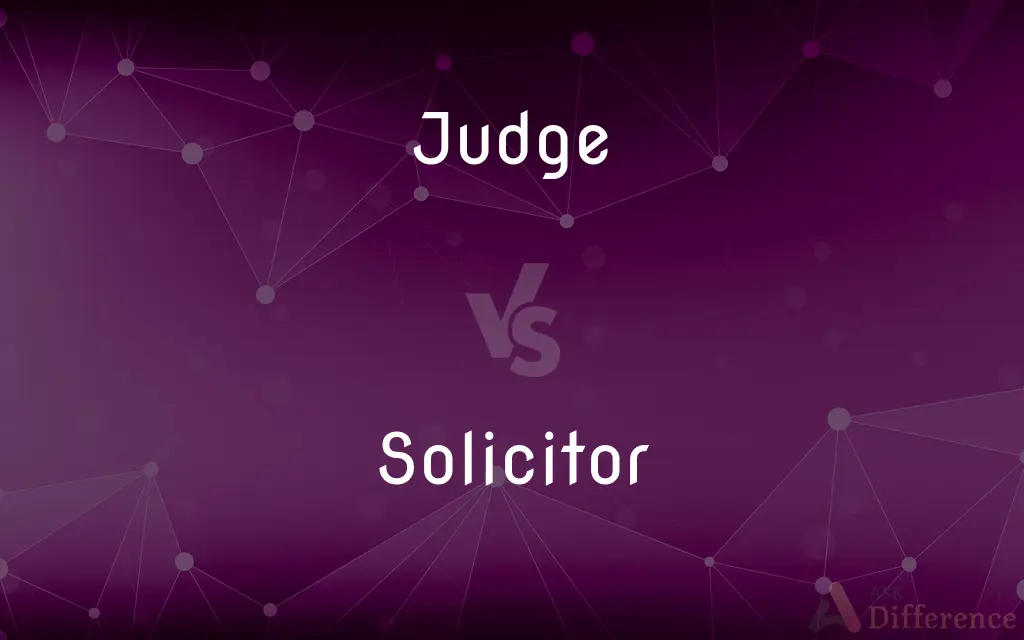Judge vs. Solicitor — What's the Difference?
By Tayyaba Rehman & Fiza Rafique — Updated on April 4, 2024
A judge oversees legal proceedings and makes rulings, while a solicitor provides legal advice, prepares legal documents, and may represent clients outside of higher courts.

Difference Between Judge and Solicitor
Table of Contents
ADVERTISEMENT
Key Differences
Judges play a critical role in the legal system by presiding over court proceedings and making decisions based on the law, evidence, and legal arguments presented. They ensure that trials are conducted fairly and that legal rights are respected. Solicitors, on the other hand, are legal professionals who advise clients, prepare legal documents, and represent them in lower courts and transactions.
Judges are appointed to their positions and usually have significant legal experience, often having served as lawyers for many years. They must be impartial and are bound by strict ethical guidelines. Solicitors, whereas, are hired by clients and must be adept at navigating legal systems and procedures to advocate on their clients' behalf.
In many jurisdictions, judges do not directly interact with clients but rather with the lawyers or solicitors representing the parties in a case. Solicitors, in contrast, have direct and frequent contact with clients, providing them with legal advice, preparing their cases, and acting as their advocate in legal negotiations.
Judges are responsible for interpreting laws, assessing the evidence presented, and applying legal principles to the facts of a case to reach a verdict or decision. Solicitors, on the other hand, prepare cases by gathering evidence, researching legal precedents, and drafting legal documents needed for court proceedings or transactions.
While judges have the authority to make legally binding decisions and judgments, solicitors do not have this power. Instead, solicitors aim to secure the best possible outcome for their clients through negotiation, mediation, or litigation, depending on the nature of the case.
ADVERTISEMENT
Comparison Chart
Role
Presides over court proceedings, makes rulings
Advises clients, prepares legal documents
Legal Authority
Makes legally binding decisions
Represents clients, cannot make legal rulings
Interaction
With lawyers/solicitors in court
Directly with clients
Responsibilities
Interpret laws, assess evidence
Advise clients, draft documents, negotiate
Setting
Courts
Offices, legal settings, sometimes courts
Compare with Definitions
Judge
To determine or pronounce after consideration.
The panel will judge the essays based on originality and clarity.
Solicitor
A legal professional who advises clients, prepares legal documents, and represents clients in legal matters.
The family hired a solicitor to draft their will.
Judge
A public official appointed to decide cases in a court of law.
The judge ruled in favor of the defendant.
Solicitor
In the UK, a lawyer qualified to represent clients in lower courts.
The solicitor represented the client in the magistrate's court.
Judge
Someone who makes informed decisions or conclusions.
As a judge of character, she rarely misjudged someone's intentions.
Solicitor
Someone who solicits, especially for business or donations.
The charity sent out solicitors to request donations.
Judge
To form an opinion or conclusion about something.
It's hard to judge the success of the project at this early stage.
Solicitor
In some jurisdictions, a lawyer who deals primarily with office work, wills, and real estate transactions.
We consulted a solicitor to handle the purchase of our new home.
Judge
An official at a competition who decides the winners.
The judges at the baking competition were impressed by the creativity of the entries.
Solicitor
Often works in partnership in law firms or is self-employed.
The solicitor offered a free initial consultation.
Judge
A judge is a person who presides over court proceedings, either alone or as a part of a panel of judges. The powers, functions, method of appointment, discipline, and training of judges vary widely across different jurisdictions.
Solicitor
A solicitor is a legal practitioner who traditionally deals with most of the legal matters in some jurisdictions. A person must have legally-defined qualifications, which vary from one jurisdiction to another, to be described as a solicitor and enabled to practise there as such.
Judge
To form an opinion or estimation of after careful consideration
Judge heights.
Judging character.
Solicitor
A member of the legal profession qualified to deal with conveyancing, the drawing up of wills, and other legal matters. A solicitor may also instruct barristers and represent clients in some courts.
Judge
(Law) To hear and decide on in a court of law
Judge a case.
Solicitor
A person who tries to obtain business orders, advertising, etc.; a canvasser
She had been a telephone solicitor for a Chicago newspaper
Judge
To pass sentence on; condemn.
Solicitor
One that solicits, especially one that seeks trade or contributions.
Judge
To act as one appointed to decide the winners of
Judge an essay contest.
Solicitor
An attorney holding a public office that handles cases involving a city, state, or other jurisdiction.
Judge
To determine or declare after consideration or deliberation
Most people judged him negligent in performing his duties as a parent.
Solicitor
Chiefly British An attorney who advises clients on legal matters, represents clients in certain lower courts, and prepares cases for barristers to present in the higher courts.
Judge
(Informal) To have as an opinion or assumption; suppose
I judge you're right.
Solicitor
(Canadian) A barrister and solicitor; a lawyer.
Judge
(Bible) To govern; rule. Used of an ancient Israelite leader.
Solicitor
One who solicits.
Judge
To form an opinion or evaluation.
Solicitor
In many common law jurisdictions, a type of lawyer whose traditional role is to offer legal services to clients apart from acting as their advocate in court. A solicitor instructs barristers to act as an advocate for their client in court, although rights of audience for solicitors vary according to jurisdiction.
Judge
To act or decide as a judge.
Solicitor
In English Canada and in parts of Australia, a type of lawyer who historically held the same role as above, but whose role has in modern times been merged with that of a barrister.
Judge
One who makes estimates as to worth, quality, or fitness
A good judge of used cars.
A poor judge of character.
Solicitor
In parts of the U.S., the chief legal officer of a city, town or other jurisdiction.
Judge
(Law) A public official who hears and decides cases brought in court.
Solicitor
(North America) A person soliciting sales, especially door to door.
Judge
(Law) A public official who hears and decides cases or matters in a forum other than a court, such as an administrative proceeding.
Solicitor
One who solicits.
Judge
One appointed to decide the winners of a contest or competition.
Solicitor
An attorney or advocate; one who represents another in court; - formerly, in English practice, the professional designation of a person admitted to practice in a court of chancery or equity. See the Note under Attorney.
Judge
A leader of the Israelites during a period of about 400 years between the death of Joshua and the accession of Saul.
Solicitor
A petitioner who solicits contributions or trade or votes
Judge
Judges (used with a sing. verb) See Table at Bible.
Solicitor
A British lawyer who gives legal advice and prepares legal documents
Judge
A public official whose duty it is to administer the law, especially by presiding over trials and rendering judgments; a justice.
Judge
A person who decides the fate of someone or something that has been called into question.
Judge
A person officiating at a sports event, a contest, or similar.
At a boxing match, the decision of the judges is final.
Judge
A person who evaluates something or forms an opinion.
She is a good judge of wine.
They say he is a poor judge of character considering all the unreliable friends he has made.
Judge
A shophet, a temporary leader appointed in times of crisis in ancient Israel.
Judge
(transitive) To sit in judgment on; to pass sentence on (a person or matter).
A higher power will judge you after you are dead.
Judge
(intransitive) To sit in judgment, to act as judge.
Justices in this country judge without appeal.
Judge
(transitive) To judicially rule or determine.
Judge
To sentence to punishment, to judicially condemn.
He was judged to die for his crimes.
Judge
To award judicially; to adjudge.
Judge
(transitive) To form an opinion on; to appraise.
I judge a man’s character by the cut of his suit.
Judge
To constitute a fitting appraisal or criterion of; to provide a basis for forming an opinion on.
Judge
(intransitive) To arbitrate; to pass opinion on something, especially to settle a dispute etc.
We cannot both be right: you must judge between us.
Judge
(transitive) To have as an opinion; to consider, suppose.
I judge it safe to leave the house once again.
Judge
(ambitransitive) To form an opinion; to infer.
I judge from the sky that it might rain later.
Judge
(ambitransitive) To criticize or label another person or thing.
Judge
(ambitransitive) To govern as biblical judge or shophet (over some jurisdiction).
Judge
A public officer who is invested with authority to hear and determine litigated causes, and to administer justice between parties in courts held for that purpose.
The parts of a judge in hearing are four: to direct the evidence; to moderate length, repetition, or impertinency of speech; to recapitulate, select, and collate the material points of that which hath been said; and to give the rule or sentence.
Judge
One who has skill, knowledge, or experience, sufficient to decide on the merits of a question, or on the quality or value of anything; one who discerns properties or relations with skill and readiness; a connoisseur; an expert; a critic.
A man who is no judge of law may be a good judge of poetry, or eloquence, or of the merits of a painting.
Judge
A person appointed to decide in a trial of skill, speed, etc., between two or more parties; an umpire; as, a judge in a horse race.
Judge
One of the supreme magistrates, with both civil and military powers, who governed Israel for more than four hundred years.
Judge
The title of the seventh book of the Old Testament; the Book of Judges.
Judge
To hear and determine, as in causes on trial; to decide as a judge; to give judgment; to pass sentence.
The Lord judge between thee and me.
Father, who art judgeOf all things made, and judgest only right!
Judge
To compare facts or ideas, and perceive their relations and attributes, and thus distinguish truth from falsehood; to determine; to discern; to distinguish; to form an opinion about.
Judge not according to the appearance.
She is wise if I can judge of her.
Judge
To hear and determine by authority, as a case before a court, or a controversy between two parties.
Judge
To examine and pass sentence on; to try; to doom.
God shall judge the righteous and the wicked.
To bring my whole cause 'fore his holiness,And to be judged by him.
Judge
To arrogate judicial authority over; to sit in judgment upon; to be censorious toward.
Judge not, that ye be not judged.
Judge
To determine upon or deliberation; to esteem; to think; to reckon.
If ye have judged me to be faithful to the Lord.
Judge
To exercise the functions of a magistrate over; to govern.
Make us a king to judge us.
Judge
A public official authorized to decide questions bought before a court of justice
Judge
An authority who is able to estimate worth or quality
Judge
Determine the result of (a competition)
Judge
Form an opinion of or pass judgment on;
I cannot judge some works of modern art
Judge
Judge tentatively or form an estimate of (quantities or time);
I estimate this chicken to weigh three pounds
Judge
Pronounce judgment on;
They labeled him unfit to work here
Judge
Put on trial or hear a case and sit as the judge at the trial of;
The football star was tried for the murder of his wife
The judge tried both father and son in separate trials
Common Curiosities
What is the main difference between a judge and a solicitor?
The main difference lies in their roles; judges make legal decisions in courts, while solicitors advise and represent clients in legal matters.
Are solicitors allowed to represent clients in all courts?
In some jurisdictions, solicitors can represent clients in lower courts but may need a barrister to represent clients in higher courts.
Do judges interact with clients directly?
No, judges do not interact with clients directly; they interact with the legal representatives of the clients.
How are judges appointed?
The appointment process for judges varies by jurisdiction but often involves selection by a governmental or judicial body.
What types of cases do solicitors handle?
Solicitors handle a wide range of cases, including family law, criminal law, and commercial law.
Can a judge refuse to hear a case?
Judges can recuse themselves from cases where there is a conflict of interest, but they cannot refuse to hear a case without a valid reason.
Can a solicitor become a judge?
Yes, solicitors can become judges, typically after gaining extensive experience in legal practice.
Can solicitors draft legal documents?
Yes, drafting legal documents is a key part of a solicitor's job.
Do judges provide legal advice?
No, judges do not provide legal advice; their role is to oversee court proceedings and make decisions.
What qualifications are needed to become a judge or solicitor?
Both roles require a legal education. Becoming a judge also typically requires many years of experience as a solicitor or barrister.
Do solicitors have to follow ethical guidelines?
Yes, solicitors must adhere to strict ethical guidelines and professional standards.
Are judges involved in the negotiation process?
No, judges are not involved in negotiation processes; they preside over court proceedings.
Who makes legal rulings in a court?
Judges are responsible for making legal rulings in a court.
Is a solicitor the same as a lawyer?
In many jurisdictions, the term solicitor is used to describe a specific type of lawyer.
What happens if a solicitor misrepresents a client?
A solicitor misrepresenting a client can face legal penalties, including disbarment.
Share Your Discovery

Previous Comparison
Mask vs. Masque
Next Comparison
Pictorial vs. VisualAuthor Spotlight
Written by
Tayyaba RehmanTayyaba Rehman is a distinguished writer, currently serving as a primary contributor to askdifference.com. As a researcher in semantics and etymology, Tayyaba's passion for the complexity of languages and their distinctions has found a perfect home on the platform. Tayyaba delves into the intricacies of language, distinguishing between commonly confused words and phrases, thereby providing clarity for readers worldwide.
Co-written by
Fiza RafiqueFiza Rafique is a skilled content writer at AskDifference.com, where she meticulously refines and enhances written pieces. Drawing from her vast editorial expertise, Fiza ensures clarity, accuracy, and precision in every article. Passionate about language, she continually seeks to elevate the quality of content for readers worldwide.















































